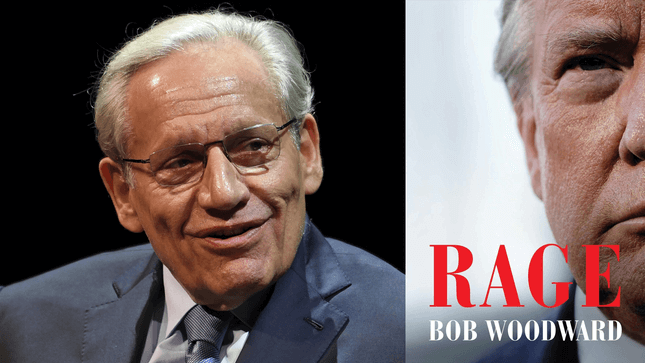The Lucrative Cynicism of the Trump Tell-All
Latest

On Wednesday, news broke that, while writing his second book on the Trump administration, the famed investigative reporter Bob Woodward had sat for months on crucial interviews with the president. During those sessions, Donald Trump admitted that he knew the novel coronavirus was spread through the air and that the virus was far more deadly than he had been publicly claiming. Woodward is, justifiably, now under fire for waiting to reveal those damning details until this moment, right before the launch of his book, Rage, which is out September 15, using the scoop as promo rather than ammunition to shift Trump’s deadly response to the covid-19 pandemic.
Regardless of what impact that revelation would have made, it is a contemptible decision to put book sales above the public interest. And Rage, after all, would have likely sold well anyway—Fear, Woodward’s first book on the Trump administration, has sold more than two million copies and was at the time the fastest-selling book in Simon & Schuster’s history. That record has now been broken by another Trump-related book, Mary Trump’s Too Much and Never Enough. These books are pitched with the idea that it’s a possible, even worthwhile, endeavor to shed new light on Trump’s psyche–an act that’s branded as some sort of (extremely belated) reckoning and mea culpa. In reality, the books are united by another, balder truth—they are very, very profitable.
The books are united by another, balder truth—they are very, very profitable
The Trump tell-all is a genre of its own at this point. This summer alone has already brought us John Bolton’s The Room Where It Happened, the aforementioned Too Much and Never Enough, Melania and Me by Melania’s former BFF and adviser Stephanie Winston Wolkoff, and Disloyal by Trump’s former fixer and attorney Michael Cohen. On top of the memoirs, we also have Donald Trump v. The United States by the New York Times reporter Michael Schmidt and Hoax: Donald Trump, Fox News, and the Dangerous Distortion of Truth by the CNN host Brian Stelter.
In its first week alone, Bolton’s memoir moved more than 780,000 copies; Mary Trump’s memoir almost doubled that astronomical number. Of those books that I listed above, five are currently on Amazon’s list of top-selling non-fiction books, with three of them—Melania and Me, Donald Trump v. The United States, and Disloyal—at the very top. Their releases have followed a predictable pattern: the most incendiary, headline-grabbing tidbits are teased out in the days before it officially hits the shelves, generating a wave of breathless coverage; the book then hits the bestseller lists; its author does a second wave of press, generating more headlines. Eventually, our collective attention wanes, just before the process begins again with the next book.
Wash, rinse, repeat, until I personally would like to die from despair.
The despair, I think, comes from a bad place—that despite all of the revealing details in these Trump tell-alls, despite all of the oxygen they suck up in the attention economy, despite their popularity, they are meaningless—at least when it comes to the books’ ability to influence the decision looming before us in November. The underlying unspoken justification for the endless media circus is the notion that they should motivate at least some of us to action.
Despite all of the oxygen they suck up in the attention economy, despite their popularity, they are meaningless
There is clearly a hungry audience for these books in the small segment of the American public that’s squarely in the middle of the Venn diagram of those who voraciously read about politics, have the disposable income to spend what’s likely hundreds of dollars on a shelf full of Trump books, and who have the leisure time to actually read every single one of them. But what I’m afraid of is that these books perform the exact opposite of their supposed role, that the impulse to seek verification of the glaringly obvious destruction of the Trump administration is a sort of self-soother, a version of adult thumb-sucking.
And yet we find ourselves here, on a seemingly neverending carousel that is extremely beneficial and profitable for a few: Authors themselves; book publishers who have been riding the wave of interest in Trump-related memoirs, tell-alls, and explainers; and media outlets, including Jezebel, which can generate a reliable number of clicks by repackaging the contents of each book in a quick and easy blog.
It is, admittedly, a cycle that I feel no small level of shame participating in, even if I have knowingly turned myself into a cog in the attention machine. Earlier this week, I wrote a blog about Cohen’s book with the headline, “I Found All the Most Deranged Trump Anecdotes From Michael Cohen’s Disloyal, So You Don’t Have To Read the Cursed Book.” According to Chartbeat, it’s one of the most-read blogs on Jezebel this week. Just the week before, I gave Stephanie Winston Wolkoff’s Melania and Me the same treatment, trawling like a bottom-feeder through its pages for tidbits to offer up to the blog gods. In June, there was another book about Melania, The Art of Her Deal: The Untold Story of Melania Trump; the blog I dashed off about that book did about as well. And that’s just the past few weeks. Last year, there was Free, Melania; Piety & Power: Mike Pence and the Taking of the White House; Team of Vipers. I blogged about those too.
All of these authors, whatever their stated motivations, are at the end of the day continuing to profit handsomely from their association with the Trumps. But as with any awful, tragic disaster, it’s impossible to get people to turn away.